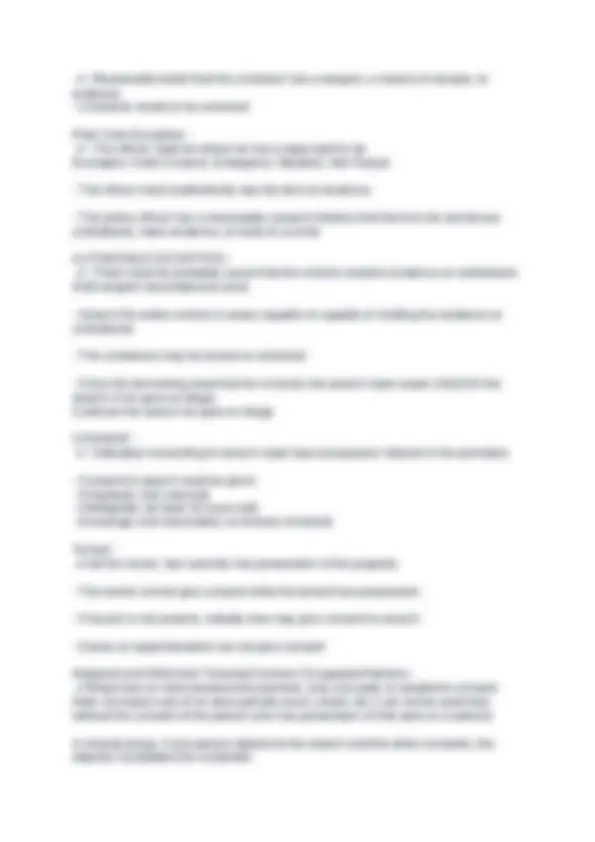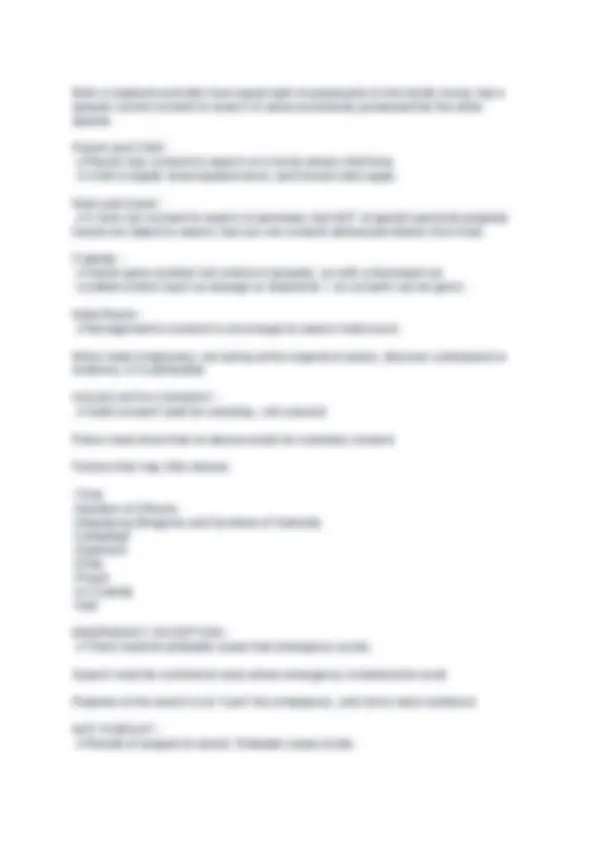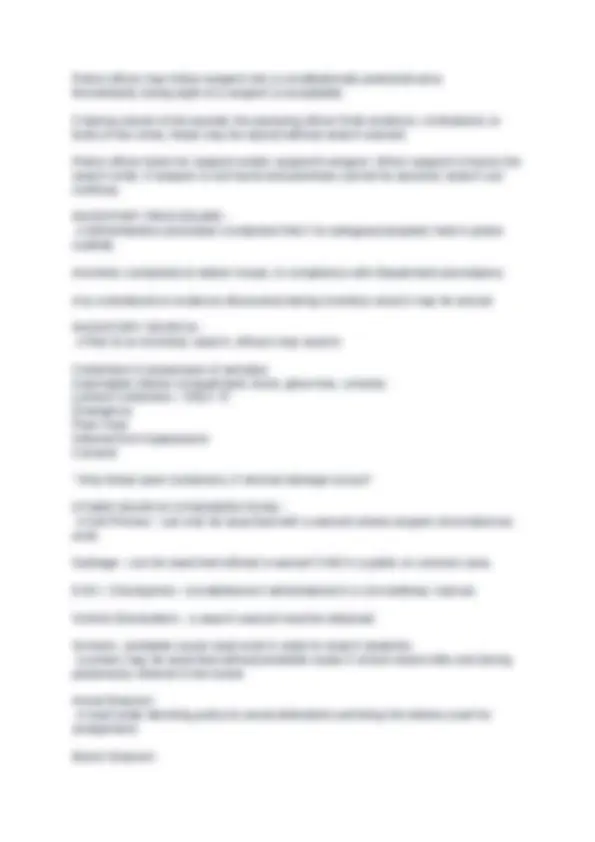





Study with the several resources on Docsity

Earn points by helping other students or get them with a premium plan


Prepare for your exams
Study with the several resources on Docsity

Earn points to download
Earn points by helping other students or get them with a premium plan
Community
Ask the community for help and clear up your study doubts
Discover the best universities in your country according to Docsity users
Free resources
Download our free guides on studying techniques, anxiety management strategies, and thesis advice from Docsity tutors
This study guide explores the fourth amendment, covering areas protected, exceptions to search warrant requirements, and the exclusionary rule. It includes topics like privacy, seizure, automobiles, asserting the exclusionary rule, search incident to arrest, valid arrests, limited scope, plain view exception, consent, custody, emergency exception, inventory search, cell phones, garbage, d.w.i. Checkpoints, schools, arrest warrant, bench warrant, felony warrant, and search warrant execution.
Typology: Exams
1 / 7

This page cannot be seen from the preview
Don't miss anything!




Search - ✔️an individual's interest in privacy Seizure - ✔️deprives an individual of dominion over their person or property AREAS PROTECTED BY THE FOURTH AMENDMENT - ✔️Your Person Your Home Curtilage Automobiles (limited protection) ASSERTING THE EXCLUSIONARY RULE - ✔️Must establish standing. Was a privacy interest infringed by the government? This requires that an actual expectation of privacy exists that society recognizes as reasonable Why does the Exclusionary Rule exist? - ✔️Personal Rights Judicial Integrity Deterrence EXCEPTIONS TO THE SEARCH WARRANT REQUIREMENT - ✔️Search Incident to a Lawful Arrest Plain View Exception Automobile Exception Consent, search by consent given Emergency Exception Stop, Question, and Possibly Frisk Hot Pursuit Inventory Procedure Purpose of Search Incident to a Lawful Arrest - ✔️Endanger: prevent the prisoner from securing a weapon or object that endangers police officers or the public Escape: prevent the prisoner from acquiring any object which may provide a means of escape Evidence: prevent concealment or destruction of evidence Arrest must be... - ✔️Valid and based on probable cause
Good Faith Limited in Time, Scope, and Intensity Valid Arrests - ✔️Police Officer must have probable cause to believe that a person committed an offense before an arrest can be made "Good Faith" Arrests - ✔️Arrest must be made to achieve a legitimate law enforcement objective Arrest cannot be an EXCUSE to search the prisoner Limited in Time, Scope, and Intensity - ✔️Time - How long after the arrest was the search completed? -A search hours after initial arrest may not be valid. Scope - Where was the search conducted? -Search of the prisoner's person is automatic. Other areas/articles depend on circumstances. Intensity - How intrusive was the search? -Limited to the prisoner's person and certain accessible areas Automatic Search Incident to Lawful Arrest - ✔️The arrestee's entire body, from head to toe. Portable containers concealed on the arrestee's person. -Some examples: wallet, cigarette pack, pillbox Unlocked Containers Being Carried or Within the Lungeable Area - ✔️NOT AUTOMATICALLY SEARCHED in every arrest. If there is:
Both a husband and wife have equal right of possession to the family home, but a spouse cannot consent to search of areas exclusively possessed by the other spouse Parent and Child - ✔️Parent may consent to search of a home where child lives. -If child is legally emancipated minor, joint tenant rules apply. Host and Guest - ✔️A host can consent to search of premises, but NOT of guest's personal property. Guest can object to search, but can not consent without permission from host. Custody - ✔️Owner gives another full control of property, as with a borrowed car. -Limited control (such as storage or shipment) = no consent can be given. Hotel Room - ✔️Management's consent is not enough to search hotel room. When hotel employees, not acting at the request of police, discover contraband or evidence, it is admissible ISSUES WITH CONSENT - ✔️Valid consent must be voluntary, not coerced. Police must show that no duress exists for voluntary consent. Factors that may infer duress: -Time -Number of Officers -Displaying Weapons and Symbols of Authority -Language -Approach -Entry -Fraud -In Custody -Age EMERGENCY EXCEPTION - ✔️There must be probable cause that emergency exists. Search must be confined to area where emergency is believed to exist. Purpose of the search is to "cure" the emergency, and not to seize evidence. HOT PURSUIT - ✔️Pursuit of suspect to arrest. Probable cause exists.
Police officer may follow suspect into a constitutionally protected area. Momentarily losing sight of a suspect is acceptable. If during course of the pursuit, the pursuing officer finds evidence, contraband, or fruits of the crime, these may be seized without search warrant. Police officer looks for suspect and/or suspect's weapon. When suspect is found, the search ends. If weapon is not found and premises cannot be secured, search can continue. INVENTORY PROCEDURE - ✔️Administrative procedure conducted ONLY to safeguard property held in police custody. Inventory conducted at station house, in compliance with Department procedures. Any contraband or evidence discovered during inventory search may be seized. INVENTORY SEARCH - ✔️Part of an inventory search, officers may search: Containers in possession of arrestee. Automobile interior compartment, trunk, glove box, console. Locked Containers - ONLY IF: Emergency Plain View Inferred from Appearance Consent
Fruits of the crime SEIZE THESE ITEMS IMMEDIATELY, even if not listed in search warrant. Mere evidence must be named in the search warrant.